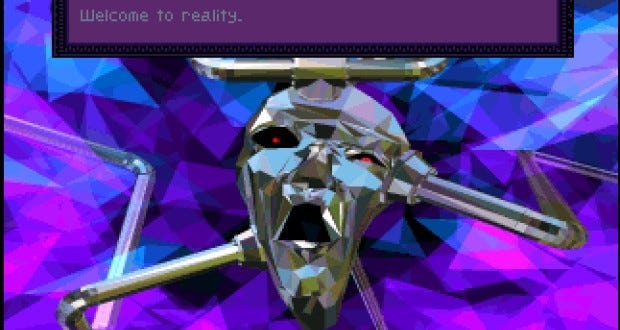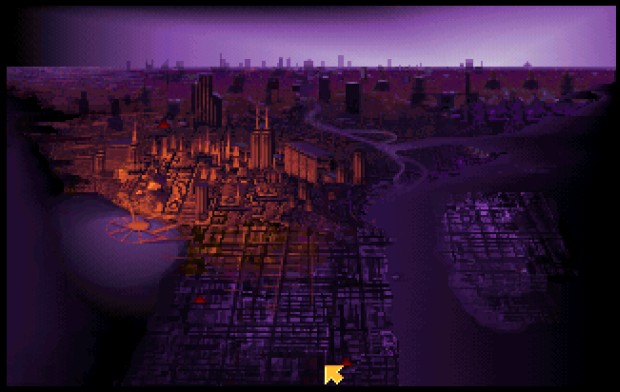The Ambitious Failure Of Cybervamp RPG BloodNet
Icarian Bite
I'm known for writing about old games that are worth playing today. This is something of a departure, as I can't really recommend Bloodnet [Wikipedia page] with a clear conscience. It isn't a good game. But it's been lurking in my mind for the better part of 20 years.
It's a rare game that would excite a traditional RPG fan as well as a genre cynic like me - an unforgiving, non-linear, party-based adventure with turn-based combat and minimal handholding, set in a world devoid of goddamn elves. Instead, it's set in the kind of future that only the early 1990s could conjure up.
Cast as Ransom Stark, you're a 'disgrunt' - a former employee of evil megacorporation du jour, TransTechnicals, discarded when your work made you sick. Now you're one of many surviving the dystopian microcosm of Manhattan via illegal activities like 'decking' (unauthorised Matrix use. No, not that one. Well, actually....), theft, espionage, and of course murder. Then you're bitten by a vampire.
Fortunately, your treatment - a neural implant designed by your missing friend Deirdre - has delayed your transformation, leaving you with a few days to seek a cure, find Deirdre, free the Matrix from corporate control, and maybe quite literally stick it to The Man.
Your greatest obstacle, however, will be the controls, which are atrocious. I criticised Darklands for its controls, but by the standard of its time, they're not particularly bad. Bloodnet's are. The simplest actions are slow and unreliable. Walking across a room feels like taking a drunk cow for a walk. Two right clicks mean "examine", but one means "take", and clicks register unreliably, making accidental theft and unwanted conversations common. Frustration is exacerbated by the graphics, with character sprites and portraits apparently matched at random, and the mixture of 3D rendered backdrops and 2D NPCs is awkward. The sound barely exists, and I wish I could say as much for the music, which is utterly terrible. Just be glad modern machines can so easily run Winamp in the background.
The engine is shared with Microprose's earlier (and also ambitious) Challenge of the Five Realms, right down to the entertaining "what would you do?" character creation. Everything happens on static backdrops superimposed with immobile sprites, until combat starts, when non-combatants vanish and everyone else can shoot or move around at a pace envied by several species of fungus. From day one, Manhattan is your electro-oyster, a map dotted with possible destinations. Travel is unrestricted and instant, with time taken off the clock when you arrive.
So there you are, cast cyber-loose in the futurescape. But don't reg yourself a dry chip - scope out some boards and go fry some corp nodes.
Oh, the dialogue in Bloodnet is silly. It's so silly. There's tonnes of it, and you absolutely must keep notes. But it's kind of compelling. When Stark talks to his old accomplices, there's a rare sense of loyalty and friendship in the conversation, overflowing as it is with adolescent proto-politics and cheesy 90s cyber-everything slang. Stark's world is one of gangs and violence and ideological rifts. He's able to survive not because he's a superhero, but because of his loose network of old friends and allies who are willing to help him out.
That's how you know he's one of the good guys. It's not because of his stats or who he kills. It's because he's proven himself trustworthy. They're not wowed by meeting a famous hero - they're glad to see someone in this dark and dangerous world who they can call a friend. It's in the easy gossip, the bickering, even the recriminations. It's in the unhesitating offers to help you, and the nuggets of information these people share to survive. They trade in guns and implants and hacking devices, but also information. Money is barely a concern, despite the theme of megacorporate hegemony – rather, success in this world is determined by what and who you know.
They reminisce about people you'll never meet. They ask for things they have a use for. It's nothing new, but the presentation is more interesting than "bring me 10 wolf anuses, which I can't get myself because this is an RPG and we don't give a toss". That woman who drives the plot, your saviour Deirdre, is not a love interest. You're looking for her because she's your friend and she's in trouble. An old girlfriend does turn up - she's still a friend, but it's complicated. Characters who care for each other as equals despite difficult pasts. Why is that scarce?
Then there's that Matrix thing. It isn't the internet, it's more like the Matrix that came from the 'constantly green' district of Hollywood a few years later. Decking means uploading your consciousness, and is incredibly dangerous even without the corporate overlords patrolling cyberspace for errant souls. It's presented in that ridiculous way the internet often was back then, as meaningless 3D shapes and surreal geometric planes to physically move across like the Lawnmower Man, or that Simpsons episode. This kind of world has never been done well in a game, and Bloodnet suffers even more from hindsight.
What does work though, is this idea of the Matrix as dangerous. The concept is scary. It isn't cool, it's a risky place where at any moment you might get caught and your memory wiped, or worse. TransTech isn't just a generic evil corporation, bad because money is bad. It's a secretive, frightening mystery. It only has one building, but its presence is threatening and ubiquitous. Cybernetic ugrades and decking enhancements aren't just a free +1; they feel like a dangerous experiment in altering your very essence.
Because of this, its opaque nature sometimes works in its favour. It hints around things that may or may not be true or extant, and might be helpful or best avoided. It fits the cyberpunk theme, too, as information and the struggle to free it from corporate greed are key plot points - there's even an Electronic Frontier Foundation. It's cyberpunk because it's about the ideological struggles intrinsic to a world that becomes less speculative fiction every year.
Megacorp staff are social castes, and the punk plebs are politically and economically fractured groups. They're not comfortable people choosing to wear the dress of the fashionably downtrodden; they're desperate, sick, and angry, and even they have it better than society's real victims. Homeless kids barter junk for drugs, monsters prey freely on the vulnerable, people die because they can't pay for healthcare. The vampires feed on the humans and the corporation feeds on the society. It's not high art by any means, but the concepts are there. It may be about vampires and lasers and robots, but the conflict is mostly human, and would remain so without the blunt tool of the 'humanity meter' depleting with every heinous act.
It's easy to rattle off a list of Things You Can Do In This Game, without regard for whether they're worth the bother. In Bloodnet's case, while it allows much, its handling of the result varies. You can go anywhere. You can vamp-murder almost anyone. You can give a priest a flamethrower and make her torch homeless children. You can build a cyborg and transfer a man's mind into it, or replace much of your body with the parts. You can bolt together tools from junk, cook up your own drugs and pump them into your gimpy sidekick before feeding on him. You will definitely render it unwinnable at least once.
The game doesn't react to all of these, and some are functionally flat - stat boosts, or a character simply vanishing. This is no Alpha Protocol, with everyone you meet judging your every move, but neither are you casting meaningless numbers into an uncaring void, as NPCs react to some of your choices and teammates comment on events or leave if you upset them. But at times, you'll gun someone down and everyone else in the room will plough on regardless.
Sadly, combat is a dud. While there are myriad options, the vast majority are pointless. For all the bioweapons, vampire bites, and robot-disabling USB sticks, it's much more effective to give everyone a dirt cheap shotgun or laser rifle and aim for the chest or head every time. It's one thing to accomodate powergaming - players can take or leave that as we like - but it's quite another to create a system that's easily bested with the simplest, cheapest option.
It's a shame, is what it is. And that's more or less what I take away from Bloodnet. It is in many ways a game made about 20 years too soon. It toys with some very silly stuff, particularly at the end, as you'd expect from "vampires in cyberspace", but its ideas and ambition occasionally shine through. Can I recommend you play it? No. But I really hope someone does it again.









